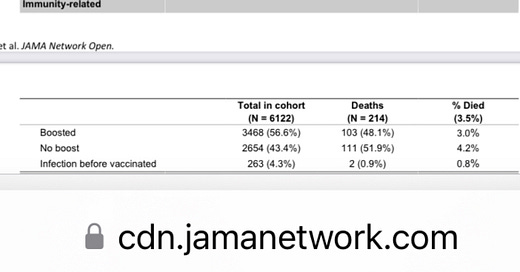THIS ARTICLE HAS BEEN CORRECTED/RETRACTED
(Original, incorrect headline): A new study shows VACCINATED people with blood cancers were four times more likely to die after Covid infections than the unjabbed
CORRECTION TO ARTICLE (published as separate note):
UGH. Worst mistake in two years.
My previous article claimed “a new study shows VACCINATED people with blood cancers were four times more likely to die after Covid infections than the unjabbed.”
But I am wrong.
A reader notes that the appendix shows “infection before vaccination” line refers to a “previous…
Keep reading with a 7-day free trial
Subscribe to Unreported Truths to keep reading this post and get 7 days of free access to the full post archives.



